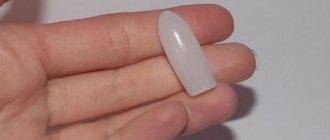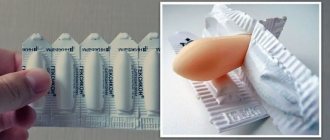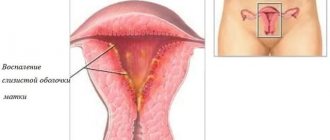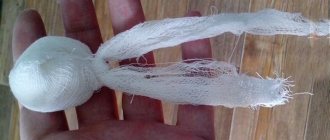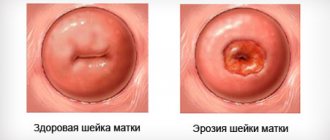Various suppositories for endometritis: which ones are prescribed and why
The basis of the course of treatment for endometritis is antibacterial agents, which are used in various dosage forms. Preparations for local use in the form of rectal and vaginal suppositories show high effectiveness. Suppositories are available with different compositions and pharmacological effects. They can have anti-inflammatory, antimicrobial and absorbable effects during adhesions.
Read in this article
Indications for use
After detecting endometritis, the doctor will prescribe complex therapy, which will include a drug for topical use. Terzhinan should be used for medicinal purposes in the following cases:
- when trichomonas are detected in vaginal smears;
- against the background of colpitis and vulvovaginitis;
- with bacterial vaginosis accompanying endometritis;
- against the background of detected thrush (vaginal candidiasis);
- with acute inflammation of the uterus caused by various types of infection;
- against the background of typical inflammatory symptoms in the cervical canal (erosion, cervicitis).
The need for prophylactic use of antimicrobial suppositories arises in the following situations:
- before any therapeutic and diagnostic intervention in the uterine cavity (probing, aspiration, hysteroscopy, abortion, insertion or removal of a device);
- during examination and treatment of erosion on the cervix (colposcopy, biopsy, cauterization);
- against the background of chronic asymptomatic endometritis, as one of the components of preconception preparation;
- against the background of gestation in the presence of any focus of chronic infection in the reproductive organs;
- before natural childbirth to prevent birth injuries and infection of the baby.
Significant advantages of Terzhinan for therapeutic and prophylactic use are the possibility of use during pregnancy (starting from 14 weeks) and high antimicrobial activity against many different microorganisms. By strictly following the doctor’s recommendations, you can get the most beneficial effect when using the drug.
What effective suppositories are prescribed for treatment of endometritis?
Therapy of any inflammatory disease of the female reproductive system is a complex system, the main role in which is given to antibacterial and anti-inflammatory drugs. They are usually prescribed in the form of tablets or injections, but suppositories are an equally effective dosage form.
The advantage of suppositories is their direct impact on infectious agents, which contributes to their rapid destruction.
In addition, the active ingredients bypass the gastrointestinal tract and do not have a negative effect on the liver and kidneys.
In the treatment of endometritis, suppositories can be used in two ways:
- by inserting a suppository deep into the vagina (Flagyl, Hexicon and others);
- rectally, that is, by introducing it into the rectum through the anus (Diclofenac, Longidaza and others).
The choice of specific suppositories for the treatment of endometritis depends on many factors:
- the nature of the disease;
- acute or chronic stage;
- severity of symptoms;
- individual reaction to a specific drug.
Types of suppositories
Based on their pharmacological action, the following types of suppositories are distinguished:
- products with an antibacterial effect aimed at pathogenic microflora in the vagina;
- antimicrobial, suppressing the growth and reproduction of pathogenic bacteria;
- preventing the formation of adhesions and having a resolving effect.
Suppositories may contain active substances with narrowly targeted action, but they can also be combined.
And here is more information about the principles of treatment of endometritis.
Anti-inflammatory
Suppositories of this type are used to relieve unpleasant symptoms of a pathological process that can affect other organs of the reproductive system in addition to the uterus.
Drugs aimed at eliminating inflammation are divided into two large groups:
- Steroid anti-inflammatory drugs , which contain natural or synthetic hormones. Such drugs are very effective in relieving the symptoms of inflammation, relieving itching and pain. In order not to upset the hormonal balance, such suppositories can only be used under the strict supervision of a doctor.
- Non-steroidal anti-inflammatory drugs . In modern gynecological practice, such drugs are used very widely because they have significantly fewer side effects.
Non-steroidal anti-inflammatory drugs successfully suppress the production of hormone-like substances - prostaglandins, which increase pain in endometritis and contribute to the spread of the inflammatory process.
During treatment, it is recommended to prescribe rectal suppositories based on NSAIDs:
- Indomethacin;
- Diclofenac;
- Voltaren,
- Naklofen and others.
The course of treatment with rectal suppositories lasts on average 7 - 10 days, the Diclofenac suppository is administered once a day before bedtime, Indomethacin - 3 times a day.
After a course of anti-inflammatory therapy using suppositories, the balance of the vaginal microflora may be disrupted. To restore it, vaginal suppositories with lacto- and bifidobacteria are prescribed - Acylact, Bifidumbacterin or others with a similar effect.
Antibacterial
Doctors consider metronidazole suppositories, which can be produced under various brands, to be the most effective remedy against pathogenic microflora. The drug is not an antibiotic; unlike them, it is of synthetic origin, but has a similar antibacterial effect. Metronidazole analogues include the following drugs:
- Flagyl,
- Nikamed,
- Efloran,
- other.
The course of treatment with suppositories is on average 10 days for uncomplicated forms, one suppository is used per day.
Another effective antibacterial agent in the form of suppositories for the treatment of endometritis is Hexicon, which, thanks to the active ingredient digluconate chlorhexidine, has not only an antibacterial but also an anti-inflammatory effect. The advantage of the drug is the absence of negative effects on the vaginal microflora. Candles are used for 10 days, 2 pieces per day.
Other drugs of similar pharmacological action include:
- Betadine suppositories. Effective in the fight against almost all representatives of pathogenic microflora, except for the tuberculosis bacillus. Thanks to the active ingredient povidone iodine, the drug has an inhibitory effect on fungi, viruses and bacteria.
- Clotrimazole. Used to suppress almost all genital infections, including trichomoniasis.
- Osarbon is effective in the treatment of endometritis caused by sexually transmitted infections.
- Pimafucin is prescribed to combat fungal infections; its main advantage is the minimum number of contraindications.
After a course of therapy with antibacterial suppositories, measures should also be taken to restore the normal vaginal environment.
Combined
Such drugs are most popular in the treatment of endometritis and other gynecological diseases of infectious and inflammatory etiology, since by using one type of suppository it is possible to simultaneously influence several negative factors.
Terzhinan suppositories, which contain Nystatin, Neomycin and Ternidazole, show very good results. Thanks to this combination of active substances, the drug is effective in combating various types of microbes, and imidazole derivatives provide an anti-inflammatory effect.
Other suppositories of combined action include:
- Polygynax, the composition of which is almost similar to Terzhinan, but instead of Terinizadol, the active substances include Polymyxin. The course of treatment depends on the severity of the disease and lasts one to two weeks; you need to administer 1 - 2 suppositories per day.
- Meratin-combi, which has good anti-inflammatory and antimicrobial effects, is prescribed for 10 days, one suppository.
About Terzhinan candles, watch this video:
Herbal for chronic endometritis
As an auxiliary therapy, you can use suppositories on a natural basis; these can be either ready-made pharmaceutical forms or homemade ones.
Terzhinan for endometritis reviews
Vaginal discharge during pelvic inflammation is caused by a combined infection in the uterus and cervical canal.
Terzhinan for endometritis will help remove unpleasant symptoms and will become an important therapeutic factor in the complex effect on the source of inflammation.
Reviews from doctors show that local treatment of endometritis should be carried out in all cases where there are signs of colpitis and endocervicitis.
Medicinal properties of the drug for local therapy
Local treatment of the inflammatory process in the uterus is selected by the doctor individually in each specific case: not always and not all women need to use drugs for insertion into the vagina. Vaginal suppositories for endometritis should provide the following therapeutic effects:
- impact on the maximum number of microorganisms;
- removing germs from the vagina;
- elimination of inflammatory symptoms (itching, burning, excessive leucorrhoea);
- preventing the spread of infection;
- prevention of endometritis during invasive diagnostic interventions.
Terzhinan contains several drugs (Ternidazole, Neomycin, Nystatin), which provides a wide spectrum of action on different types of microbes. The rapid elimination of vaginal inflammation occurs due to Prednisolone, which has an optimal anti-inflammatory effect.
Therapeutic or prophylactic use of suppositories will help prevent the penetration of microbes into the upper parts of the female genital organs, which will be the best prevention of complications (endomyometritis, salpingitis, oophoritis, adnexitis).
Indications for use
After detecting endometritis, the doctor will prescribe complex therapy, which will include a drug for topical use. Terzhinan should be used for medicinal purposes in the following cases:
- when trichomonas are detected in vaginal smears;
- against the background of colpitis and vulvovaginitis;
- with bacterial vaginosis accompanying endometritis;
- against the background of detected thrush (vaginal candidiasis);
- with acute inflammation of the uterus caused by various types of infection;
- against the background of typical inflammatory symptoms in the cervical canal (erosion, cervicitis).
The need for prophylactic use of antimicrobial suppositories arises in the following situations:
- before any therapeutic and diagnostic intervention in the uterine cavity (probing, aspiration, hysteroscopy, abortion, insertion or removal of a device);
- during examination and treatment of erosion on the cervix (colposcopy, biopsy, cauterization);
- against the background of chronic asymptomatic endometritis, as one of the components of preconception preparation;
- against the background of gestation in the presence of any focus of chronic infection in the reproductive organs;
- before natural childbirth to prevent birth injuries and infection of the baby.
Significant advantages of Terzhinan for therapeutic and prophylactic use are the possibility of use during pregnancy (starting from 14 weeks) and high antimicrobial activity against many different microorganisms. By strictly following the doctor’s recommendations, you can get the most beneficial effect when using the drug.
Complex therapy regimens
Depending on the purpose of use, the doctor may prescribe the following course therapy options:
- preventive (daily administration of a suppository at night 6 days before the diagnostic and treatment procedure);
- therapeutic (for acute inflammation or against the background of endometritis, you should use 10 suppositories, injecting the drug into the vagina once a day before bedtime).
Usually, after 2-3 suppositories, a woman’s unpleasant symptoms disappear, but this is not a reason to stop treatment: it is necessary to continue the therapy recommended by a specialist. Unauthorized and premature cessation of treatment may cause relapse of vaginal and uterine inflammation.
Contraindications and side effects
The disadvantage of Terzhinan is the multicomponent nature of the drug: if a woman has a tendency to allergic reactions to any antimicrobial component, individual intolerance may occur.
Prednisolone, which is part of the suppositories, is a hormonal drug, so it is undesirable to use the drug uncontrolled and for long courses (more than 20 days).
Sometimes, from the first days of treatment, a woman experiences a strong burning sensation immediately after inserting the suppository, but this initial reaction passes quickly, so there is no need to stop therapy.
The drug Terzhinan, which is part of the combination therapy for endometritis, is an important factor in local therapy. With the help of suppositories, you can remove germs from the vagina and eliminate the symptoms of local inflammation.
The drug is the most important factor in prevention - you must follow the advice of a specialist using vaginal suppositories before any gynecological operations and procedures. The safety and effectiveness of the drug help prevent intrauterine infection of the fetus and treat vaginal infections in pregnant women.
Terzhinan. Expensive tablets with their pros and cons. My experience of using it for endometritis, as well as during pregnancy.
Terzhinan with vaginal tablets when she was treating metroedometritis caused by mycoplasma and ureaplasma.
Then I began to be bothered by pains of a very strange nature - either in the intestines, or, excuse me, in the fifth point - especially when you sit down. Upon examination by a gynecologist and an ultrasound of the pelvic organs, it turned out that it was the uterus itself that hurt; there was terrible pain on palpation.
The disease is clearly not a mild one, so the treatment was serious drugs with a strong effect. This drug became one of them.
Terzhinan is a drug from the group of combined antimicrobial, antifungal and antiseptic drugs used in gynecological practice.
purchase Terzhinan at a price of 500 rubles per small package. I needed two, 6 pieces each.
Availability available almost everywhere, buying these tablets will not be a problem.
The drug has a fairly broad spectrum of action and has a combined composition. Therefore, it can also be used against infections caused, for example, by gardnerella, or from the well-known thrush.
During treatment with Terzhinan, pronounced:
- trichomonacid;
- antibacterial;
- antifungal;
- anti-inflammatory effects.
Source: https://ugri-net.ru/terzhinan-pri-jendometrite-otzyvy/
Rules for the introduction of rectal and vaginal suppositories
The effectiveness of suppositories directly depends on the correctness of their use.
Rectal suppositories to prevent the penetration of infectious agents should be administered after a cleansing enema. You need to use a candle taken from the refrigerator, this will make it easier to introduce it, since it melts easily even at room temperature. Hands should be washed thoroughly with soap before performing the procedure.
The woman herself can determine the body position in which it is easiest for her to administer suppositories; this can be done lying down, pulling her bent knees towards her stomach, standing, leaning slightly forward, or squatting.
The main thing is that when inserting the suppository, the gluteal muscles are completely relaxed, otherwise the procedure may cause pain. The suppository should pass into the rectum without any effort; for this, the anus can be lightly lubricated with a rich nourishing cream or Vaseline.
The suppository is inserted with the pointed end; after administering the drug, the gluteal muscles should be squeezed so that the drug does not spill out after dissolution. It is better to carry out the procedure before bedtime, so that you can lie down immediately after it and not get up for a long time. If suppositories need to be administered several times a day, after each procedure you need to lie down quietly for at least half an hour.
Since many suppositories contain oils, it is recommended to use a sanitary pad after using them, since some of them may leak out and stain your underwear.
Vaginal suppositories are inserted slightly differently. Firstly, it needs to be bent a little so that it stays better in the vagina.
Secondly, such medications should absolutely not be used during menstrual periods, since the components of menstrual flow can completely neutralize the therapeutic effect.
Thirdly, you should not wash your hands with soap or other detergent, since the alkaline environment can irritate the vaginal mucosa; simply rinse them with running water.
Suppositories for vaginal use are usually administered only once a day; it is advisable to carry out this procedure before going to bed.
In order to insert the prepared suppository as deep as possible into the vagina, the woman needs to lie on her side and press her bent knees to her chest; it is recommended to use a special applicator to insert suppositories. The effectiveness of the active substances depends on the depth of administration; in addition, if the product does not penetrate deep enough into the vagina, when the suppository dissolves, its contents will simply flow out.
After completing the procedure, be sure to use a sanitary pad.
The doctor must warn the woman that intimate intimacy is excluded during treatment with suppositories, as this may cause a relapse of the disease.
And here is more information about autoimmune endometritis.
Treatment of endometritis is always complex, and vaginal and rectal suppositories are an important component of the course of treatment. To increase the effectiveness of these drugs, you must carefully follow all the recommendations of your doctor.
Nonspecific vaginitis
For nonspecific colpitis, suppositories are usually prescribed, the main components of which include a broad-spectrum antibacterial drug and/or an antiseptic. Good anti-inflammatory suppositories include:
- Polygynax , consists of neomycin, nystatin, polymyxin B, is prescribed 2 times a day for a period of 5 – 14 days, (price 6 pcs. 280 rubles, 12 pcs. 450 rubles)
- Terzhinan is a combination of ternidazole, neomycin, nystatin, prednisolone, prescribed once a day in the evening for 10 days (price 240-400 rubles)
- Meratin-combi , consists of ornidazole, neomycin, nystatin and prednisolone, 1 suppository is administered before bedtime for 10 days
- Mikozhinax , a combination of metronidazole, chloramphenicol, dexamethasone and nystatin, duration of treatment 7 - 14 days, 1 - 2 suppositories per day are administered
- Hexicon , the main substance is chlorhexidine bigluconate, course of therapy is 7–10 days, it is necessary to administer 1 suppository daily (price 250 rubles)
- Betadine - the active substance iodine, is prescribed twice a day for 6 - 12 days (280-350 rubles)
Useful video
To learn how to properly insert suppositories rectally, watch this video:
Different endometritis also requires different treatment. Methods of therapy, regimens for the treatment of chronic and acute, postpartum and autoimmune, purulent will be slightly different. Although the drugs may be the same.
Acute endometritis develops due to infections. It can be purulent, catarrhal. The reasons may lie in abortion, examination procedures, and sometimes postpartum. Symptoms: fever, chills, pain. The treatment is long-term, antibacterial.
One of the effective remedies is suppositories for vaginitis. They are selected depending on the shape and type. What are needed for treatment of bacterial, atrophic, acute, mixed? Which ones will be the best and most effective during pregnancy?
In combination with medications, physiotherapy for endometritis helps to get rid of the problem as quickly as possible. Treatment may include both a set of procedures (especially important in the chronic form) and certain influences.
What suppositories are prescribed for uterine endometritis?
Endometritis is one of the most common gynecological diseases. Most cases occur during reproductive age.
Endometritis is a very dangerous disease that can cause serious complications and infertility.
In gynecological practice, endometritis that develops after childbirth is more common.
The body of the uterus consists of three layers:
- internal, which is represented by the endometrium - the mucous membrane,
- the middle or muscular layer, which is scientifically called the myometrium,
- perimetry.
Endometritis develops in the inner layer, which is represented by two parts.
- Superficial. In another way, this layer is called functional. It grows during each cycle and is then rejected by the uterus under the influence of hormones.
- Sprout or basal. This layer promotes functional growth.
When pregnancy occurs, the endometrium ensures the implantation and development of the fertilized egg in the uterine cavity.
Endometritis is an inflammation of the basal layer, while the functional one is renewed during each new cycle. In some cases, inflammation in the basal layer leads to the development of metroendometritis, which is also called endomyometritis. This pathological condition means the development of an inflammatory process in the muscle layer or myometrium.
Infection in the uterine cavity can occur due to:
- endometrial damage,
- upward path,
- descending path.
What suppositories are used in gynecology for the treatment of endometritis?
Endometritis is one of the most common gynecological diseases. Most cases occur during reproductive age.
Endometritis is a very dangerous disease that can cause serious complications and infertility.
In gynecological practice, endometritis that develops after childbirth is more common.
The body of the uterus consists of three layers:
- internal, which is represented by the endometrium - the mucous membrane;
- the middle or muscular layer, which is scientifically called the myometrium;
- perimetry.
Endometritis develops in the inner layer, which is represented by two parts.
- Superficial. In another way, this layer is called functional. It grows during each cycle and is then rejected by the uterus under the influence of hormones.
- Sprout or basal. This layer promotes functional growth.
When pregnancy occurs, the endometrium ensures the implantation and development of the fertilized egg in the uterine cavity.
Endometritis is an inflammation of the basal layer, while the functional one is renewed during each new cycle. In some cases, inflammation in the basal layer leads to the development of metroendometritis, which is also called endomyometritis. This pathological condition means the development of an inflammatory process in the muscle layer or myometrium.
Infection in the uterine cavity can occur due to:
- endometrial damage;
- the ascending path;
- descending path.
In the ascending route, infection occurs from the cervical and vaginal areas. While the descending path involves the addition of infection from the appendages.
Causes of development and its causative agents
Endometritis develops as a result of infection. The inflammatory process is facilitated by certain factors, including:
- weakened immunity;
- surgical termination of pregnancy;
- scraping;
- violation of sterility during surgical interventions;
- complete removal of the functional layer;
- frozen pregnancy or miscarriage;
- hysteroscopy;
- hysterosalpingography;
- installation of a spiral;
- inaccurate douching;
- prolonged labor;
- sexual intercourse during menstrual periods;
- long-term use of antibiotics and hormonal drugs;
- past infectious diseases;
- IVF and intrauterine insemination;
- HIV.
The causative agents of the disease are pathogenic microorganisms, which include various bacteria, fungi or viruses.
Pathology is rarely caused by one specific pathogen. Typically, the development of endometritis is caused by the interaction of several pathogenic microorganisms.
Among the bacteria that cause the disease, the most common are:
- gonococci;
- coli;
- streptococci;
- tuberculosis bacillus;
- chlamydia;
- mycoplasma and ureaplasma.
The viral nature of endometritis is due to:
- CMV;
- herpes infection;
- HPV.
Pathology is sometimes also caused by Candida fungi or Trichomonas, which is a protozoan.
Varieties
Endometritis can progress in various forms.
According to the course of the pathology, endometritis is distinguished:
- spicy;
- subacute;
- chronic.
Endometritis is differentiated depending on the symptoms as:
Depending on the pathogen, endometritis is distinguished:
- specific;
- nonspecific.
Nonspecific endometritis is caused by so-called opportunistic pathogens.
According to its histological forms, endometritis is:
- atrophic;
- cystic;
- hypertrophic.
Determining the clinical forms of endometritis is necessary to prescribe adequate treatment, which usually includes vaginal suppositories.
Symptoms and clinical manifestations
Symptoms of acute endometritis:
- signs of intoxication, such as fever, deterioration in general health;
- pain in the lower abdomen and back;
- pathological discharge of a purulent nature or mixed with blood.
Signs of chronic endometritis:
- low-grade fever;
- weakness;
- change in cycle duration;
- spotting before and after menstruation;
- pain in the lower abdomen or lower back that occurs during bowel movements or during sexual intercourse;
- mucous or purulent discharge with an unpleasant odor;
- infertility.
With endometritis, it is possible to conceive and carry a child to term. However, the chronic form of the inflammatory process in the endometrium is characterized by short-term pregnancy termination and the impossibility of implantation of the fertilized egg. This is due to the fact that the pathologically altered endometrium cannot ensure the implantation and subsequent development of the fertilized egg in the inflamed uterine cavity.
Diagnostic methods
Many women are interested in what examinations are prescribed to diagnose the inflammatory process in the uterus. To determine the pathology, it is necessary to undergo an examination, including:
- collection and analysis of the patient’s medical history;
- gynecological examination;
- laboratory tests of urine and blood;
- flora smear, bacterial culture;
- oncocytology;
- PCR research;
- ultrasound examination of the pelvis;
- hysteroscopy.
The scope of the necessary examination is prescribed by gynecologists based on the medical history and clinical picture of the disease.
Treatment
Treatment is prescribed in accordance with the severity of the inflammation and its causative agents. In the active phase of the disease or in case of exacerbation of existing inflammation, doctors prescribe treatment in a hospital setting.
For acute endometritis, the following is prescribed:
- bed rest;
- cold in the lower abdomen;
- copious fluid intake;
- special diet;
- treatment with antibiotics, which can be carried out both intramuscularly and intravenously;
- antihistamines;
- antifungal suppositories;
- means that stimulate the immune system.
Therapy for chronic inflammation can be carried out both inpatient and outpatient.
In this case, the patient is prescribed:
- antimicrobial and antibacterial drugs;
- intrauterine dialysis, which is called lavage of the uterine cavity;
- immunomodulatory and immunostimulating agents.
Treatment is prescribed individually in accordance with the clinical picture of the disease.
Candles
As a rule, for any gynecological disease of an inflammatory nature, vaginal suppositories are prescribed.
In general, suppositories are used in gynecology in the following cases:
- acute and chronic phases of endometritis;
- concomitant infections of the genital organs;
- inflammatory processes of the vagina and cervix;
- violation of microflora in the vagina;
- adhesive process.
For endometritis, suppositories are prescribed to prevent vaginal infections against the background of antibacterial therapy, as well as the re-incorporation of pathogenic microflora.
For the treatment of endometritis, the following suppositories are usually prescribed:
- with antibacterial effect. Suppositories are prescribed locally to increase the effectiveness of treatment. Such suppositories affect both pathogenic and opportunistic microflora. Most often, suppositories are prescribed simultaneously with an antibacterial and antifungal effect.
Doctors prescribe antibacterial drugs after testing the sensitivity of microorganisms to a specific drug.
- With antiseptic components. Such suppositories help suppress the growth of microorganisms. Suppositories act mainly locally and do not cause side effects.
- With herbal ingredients. Recently, candles with herbal ingredients have become quite popular. These suppositories are prescribed as an aid in treatment. It has been established that suppositories act as an anti-inflammatory, antimicrobial drug with a healing effect. Some candles can be prepared at home. The most popular candles are those based on honey or cocoa.
- With so-called proteolytic activity. These suppositories are prescribed for the prevention and treatment of adhesions. They are used in combination with antibacterial and anti-inflammatory drugs.
Suppositories, like other medications, are prescribed to women individually based on medical history and severity of the disease. Please note that to achieve maximum results, candles should be used according to the instructions. Before inserting some suppositories, it is recommended to douche the vagina with special solutions.
Surgery
In some cases, doctors prescribe surgical methods for inflammation of the uterine mucosa.
The pathological process can be caused by the use of an intrauterine device. In such cases, it should be removed and then conservative therapy should be carried out.
- If inflammation develops in the cavity of a muscular organ after spontaneous or surgical termination of pregnancy, therapeutic and diagnostic curettage of the inner layer of the uterus is prescribed.
- Timely therapy for endometritis, which is prescribed by doctors, can protect a woman from many complications caused by the inflammatory process.
Source:
Effective suppositories for endometritis: list of drugs and reviews from women
- Endometritis is a female disease of hormonal origin, in which the uterine endometrium grows and extends beyond the organ.
- When diagnosing pathology at the last stage, the only treatment option is surgery.
- Therapy for the initial form of endometritis includes medications, one of which is suppositories.
The clinical picture of inflammation of the uterine mucosa manifests itself taking into account the type of pathology, the cause of its development and the area of the lesion.
Characteristics of the disease and symptoms
The following symptoms can be identified for the acute form of endometritis:
- signs of body poisoning: fever, weakness;
- pain in the lower abdomen and back;
- pathological discharge of a purulent nature or mixed with blood.
The chronic form of endometritis is characterized by the following symptoms:
- low-grade fever;
- weakness;
- changing cycle duration;
- spotting before and after menstruation;
- pain in the lower abdomen or lower back that bothers you during bowel movements or sex;
- mucous or purulent discharge with an unpleasant odor;
- infertility.
The reason is that the pathologically altered endometrium is not able to ensure the implantation and further development of the fertilized egg in the inflamed uterine cavity.
Source: https://rdbkomi.ru/zabolevaniya/kakie-svechi-dlya-lecheniya-endometrita-ispolzuyut-v-ginekologii.html
Causes of development and its causative agents
Endometritis develops as a result of infection. The inflammatory process is facilitated by certain factors, including:
- weakening of the immune system,
- surgical termination of pregnancy,
- scraping,
- violation of sterility during surgical interventions,
- complete removal of the functional layer,
- frozen pregnancy or miscarriage,
- hysteroscopy,
- hysterosalpingography,
- installation of a spiral,
- inaccurate douching,
- long labor,
- sexual intercourse on menstruation days,
- long-term use of antibiotics and hormonal drugs,
- transferred diseases of an infectious nature,
- IVF and intrauterine insemination,
- HIV.
The causative agents of the disease are pathogenic microorganisms, which include various bacteria, fungi or viruses.
Pathology is rarely caused by one specific pathogen. Typically, the development of endometritis is caused by the interaction of several pathogenic microorganisms.
Among the bacteria that cause the disease, the most common are:
- gonococci,
- coli,
- streptococci,
- tuberculosis bacillus,
- chlamydia,
- mycoplasma and ureaplasma.
The viral nature of endometritis is due to:
Pathology is sometimes also caused by Candida fungi or Trichomonas, which is a protozoan.
Varieties
Endometritis can progress in various forms.
According to the course of the pathology, endometritis is distinguished:
Endometritis is differentiated depending on the symptoms as:
Depending on the pathogen, endometritis is distinguished:
Nonspecific endometritis is caused by so-called opportunistic pathogens.
According to its histological forms, endometritis is:
Determining the clinical forms of endometritis is necessary to prescribe adequate treatment, which usually includes vaginal suppositories.
Complex therapy regimens
Depending on the purpose of use, the doctor may prescribe the following course therapy options:
- preventive (daily administration of a suppository at night 6 days before the diagnostic and treatment procedure);
- therapeutic (for acute inflammation or against the background of endometritis, you should use 10 suppositories, injecting the drug into the vagina once a day before bedtime).
Usually, after 2-3 suppositories, a woman’s unpleasant symptoms disappear, but this is not a reason to stop treatment: it is necessary to continue the therapy recommended by a specialist. Unauthorized and premature cessation of treatment may cause relapse of vaginal and uterine inflammation.
Symptoms and clinical manifestations
Symptoms of inflammation of the uterine mucosa depend on the type of pathology, its causative agent and the area of the affected tissue.
Symptoms of acute endometritis:
- signs of intoxication, such as fever, deterioration in general health,
- pain in the lower abdomen and back,
- pathological discharge of a purulent nature or mixed with blood.
Signs of chronic endometritis:
- low-grade fever,
- weakness,
- change in cycle duration,
- spotting before and after menstruation,
- pain in the lower abdomen or lower back that occurs during bowel movements or during sexual intercourse,
- mucous or purulent discharge with an unpleasant odor,
- infertility.
With endometritis, it is possible to conceive and carry a child to term. However, the chronic form of the inflammatory process in the endometrium is characterized by short-term pregnancy termination and the impossibility of implantation of the fertilized egg. This is due to the fact that the pathologically altered endometrium cannot ensure the implantation and subsequent development of the fertilized egg in the inflamed uterine cavity.
Diagnostic methods
Many women are interested in what examinations are prescribed to diagnose the inflammatory process in the uterus. To determine the pathology, it is necessary to undergo an examination, including:
- collection and analysis of the patient’s medical history,
- gynecological examination,
- laboratory tests of urine and blood,
- flora smear, bacterial culture,
- oncocytology,
- PCR research,
- ultrasound examination of the pelvis,
- hysteroscopy.
The scope of the necessary examination is prescribed by gynecologists based on the medical history and clinical picture of the disease.
Medicinal properties of the drug for local therapy
Local treatment of the inflammatory process in the uterus is selected by the doctor individually in each specific case: not always and not all women need to use drugs for insertion into the vagina. Vaginal suppositories for endometritis should provide the following therapeutic effects:
- impact on the maximum number of microorganisms;
- removing germs from the vagina;
- elimination of inflammatory symptoms (itching, burning, excessive leucorrhoea);
- preventing the spread of infection;
- prevention of endometritis during invasive diagnostic interventions.
Terzhinan contains several drugs (Ternidazole, Neomycin, Nystatin), which provides a wide spectrum of action on different types of microbes. The rapid elimination of vaginal inflammation occurs due to Prednisolone, which has an optimal anti-inflammatory effect.
Therapeutic or prophylactic use of suppositories will help prevent the penetration of microbes into the upper parts of the female genital organs, which will be the best prevention of complications (endomyometritis, salpingitis, oophoritis, adnexitis).
Treatment
Treatment is prescribed in accordance with the severity of the inflammation and its causative agents. In the active phase of the disease or in case of exacerbation of existing inflammation, doctors prescribe treatment in a hospital setting.
For acute endometritis, the following is prescribed:
- bed rest,
- cold on the lower abdomen,
- copious fluid intake,
- special diet
- antibiotic treatment, which can be carried out both intramuscularly and intravenously,
- antihistamines,
- antifungal suppositories,
- means that stimulate the immune system.
Therapy for chronic inflammation can be carried out both inpatient and outpatient.
In this case, the patient is prescribed:
- antimicrobial and antibacterial drugs,
- intrauterine dialysis, which is called lavage of the uterine cavity,
- immunomodulatory and immunostimulating agents.
Treatment is prescribed individually in accordance with the clinical picture of the disease.
Is it possible to cure uterine endometritis in women?
If treatment for the endometrium of the uterus is started immediately after diagnosing the disease, then the entire course of treatment will be completed in about a week and a half. Advanced endometritis, turning into a chronic form, often manifests itself as a disruption of the menstrual cycle and minor bleeding. But endometritis does not always make itself felt with such obvious symptoms; some periods of its development are asymptomatic, only ultimately manifesting itself in the form of infertility.
We recommend reading: What is dyspareunia?
How to cure and what duration of treatment for acute or chronic endometritis of the uterus in women directly depends on its level of development. If the disease was detected at an early stage, then treatment can be carried out at home. But if the disease was detected in an acute form, then the patient is sent to undergo treatment only in an inpatient setting. Since in the acute form there is a risk of complications.
Candles
As a rule, for any gynecological disease of an inflammatory nature, vaginal suppositories are prescribed.
In general, suppositories are used in gynecology in the following cases:
- acute and chronic phases of endometritis,
- concomitant infections of the genital organs,
- inflammatory processes of the vagina and cervix,
- disturbance of microflora in the vagina,
- adhesive process.
For endometritis, suppositories are prescribed to prevent vaginal infections against the background of antibacterial therapy, as well as the re-incorporation of pathogenic microflora.
For the treatment of endometritis, the following suppositories are usually prescribed:
- with antibacterial effect. Suppositories are prescribed locally to increase the effectiveness of treatment. Such suppositories affect both pathogenic and opportunistic microflora. Most often, suppositories are prescribed simultaneously with an antibacterial and antifungal effect.
Doctors prescribe antibacterial drugs after testing the sensitivity of microorganisms to a specific drug.
- With antiseptic components. Such suppositories help suppress the growth of microorganisms. Suppositories act mainly locally and do not cause side effects.
- With herbal ingredients. Recently, candles with herbal ingredients have become quite popular. These suppositories are prescribed as an aid in treatment. It has been established that suppositories act as an anti-inflammatory, antimicrobial drug with a healing effect. Some candles can be prepared at home. The most popular candles are those based on honey or cocoa.
- With so-called proteolytic activity. These suppositories are prescribed for the prevention and treatment of adhesions. They are used in combination with antibacterial and anti-inflammatory drugs.
Suppositories, like other medications, are prescribed to women individually based on medical history and severity of the disease. Please note that to achieve maximum results, candles should be used according to the instructions. Before inserting some suppositories, it is recommended to douche the vagina with special solutions.
ENDOMETRIN SUPPLIES
Homeopathic suppositories Endomethrin-Antikan are created on the basis of natural ingredients collected in ecologically clean areas of the Caucasus, guaranteeing active absorption of incoming drugs, which provides a versatile effect: analgesic, anti-inflammatory, diuretic, antispasmodic, antimicrobial effect.
Women who have at least once encountered such an unpleasant disease as endometriosis know how much discomfort it can bring. In fact, not a single disease of the body is normal, which is why our medicine is so actively inventing various drugs that can help overcome this or that disease. To prevent or treat irregularities in the menstrual cycle and their painful manifestations, to remove inflammatory processes in the female genital organs, seek help from highly effective suppositories in the treatment of endometriosis. They can be purchased on the website strana-veschey.ru right now. Endometrin suppositories will very well help you solve all these unpleasant problems. Together with them, the beautiful half of humanity will be able to regain women's health and good mood.
Endometrin suppositories: composition and characteristics
Components of the drug Endometrin
- Sea buckthorn is widely used to reduce and stop pain during inflammatory processes, for rapid healing of wounds, accelerating granulation and epithelization of tissues.
- Celandine oil has a calming and analgesic effect, inhibits the growth of tumors, suppresses the activity of pathogenic microorganisms, being a natural antiseptic.
- Calendula oil is very popular for gynecological problems. Based on calendula, preparations are made against various neoplasms, fibroids and erosion. Calendula reduces the tone of the uterus, normalizes the monthly cycle and facilitates menopause. Stops the inflammatory process that accompanies endometriosis, endometritis and erosion; resists infection.
Plant essences
- Elderberry stimulates the body's protective functions and helps cope with infection. Reduces tissue swelling.
- Laconos . This plant is credited with a wide range of medicinal properties. It is believed that lakonos has bactericidal and anti-inflammatory properties, protects against the appearance of tumors, stimulates the immune system, heals damaged tissue, and soothes pain.
- Mistletoe has the ability to stop bleeding, relieve inflammation, deactivate pathogenic flora, accelerates the healing process of wounds and cracks, improves blood circulation and normalizes venous outflow, and increases the elasticity of blood vessels.
- Wormwood is used to treat inflammatory diseases of women, acts as an analgesic, and has bactericidal properties; It is believed that wormwood restores the balance between hormones; reduces the risk of unwanted tumors.
Effects of Endometrin Antican suppositories on the body:
- restore the hormonal balance of the female genital organs;
- helps eliminate endometriosis;
- stop the inflammatory process, promote the regeneration of injured tissues, resolve overgrown endometrial cells, eliminate pain and swelling;
- restore the injured mucous membrane and trophic processes in it.
Indications for the use of Endometrin Antican suppositories:
- imbalance of female sex hormones;
- in the complex treatment of endocrine diseases;
- endometriosis,
- irregular menstrual cycle;
- painful and heavy periods;
- the presence of adhesions and inflammatory processes in the female genital organs.
Instructions for use of Endometrin suppositories
Pay attention to the storage temperature. In the room where the candles will be located, the temperature should not exceed +25⁰С. At higher temperatures, the suppositories will soften, making it difficult to insert the suppository into the rectum or vagina. Therefore, candles should not be stored in hot rooms, but it is recommended to keep them in the refrigerator.
The procedure itself is carried out before bedtime. The reason is the same. The melting point of a candle is above +25⁰С. Body temperature is above +36⁰С. If, after inserting the candle, you go about your business on your feet, it will simply flow out without having time to have any effect. After inserting the suppository, you should take a horizontal position and preferably not get up for several hours.
To carry out the procedure, it is necessary to follow the basic rules:
1. Preparation
If it is necessary to insert a suppository into the rectum, you must first cleanse the intestines, for example, using an enema. The cleansing enema technique is simple. Prepare an ordinary rubber bulb and warm boiled water. Lie on your back in an empty bathroom (pre-warm it with hot water so as not to catch a cold), bend your knees and spread them shoulder-width apart, and lift your pelvis. Introduce water into the intestines using a bulb (if necessary, lubricate the tip of the bulb with Vaseline), and hold the water for a few minutes if possible. Well, or as much as you can.
Once water enters the large intestine, it begins to put pressure on its walls, stimulating peristalsis, a person has the urge to defecate, and water helps to flush out feces.
If necessary, the procedure must be repeated. The intestines are cleaned if the water coming out of it is clean. After the enema, you must wash yourself. At the same time, remember that you should not get carried away with cleansing enemas. Fanatical cleansing can lead to disruption of microflora with all the resulting negative consequences. During a long course of treatment, take medications to maintain intestinal flora (pro- and prebiotics).
When inserting vaginally, a hygienic procedure is required.
2. Introduction of the candle
You can insert the candle from any convenient position. It is important to maintain hygiene. Wash your hands thoroughly with soap and water before opening the package. To avoid infection of the mucous membranes, it is recommended to use medical gloves or a fingertip. The suppository is inserted into the vaginal cavity or intestines as deep as possible (push the suppository with your index finger).
3. Completion of the procedure
When the candle is inserted, put on clean underwear. When the candle melts, leakage is inevitable, and the laundry will be soiled in the morning, so use pads during treatment.
The full course consists of 30-60 procedures. Thus, 3 to 6 packs are required. For better results, it is recommended to repeat the course after some time. Can be used after proctological surgery.
Contraindications
No special contraindications have been identified. It is not recommended to use candles in case of hypersensitivity to bee products, as well as in the presence of an allergic reaction to one of the components of the composition.
The product is certified. TU 9360-001-22090914-99
Patent for invention No. 2308964 Manufactured by: JSC "Verbena" Homeopathic Laboratory (Pyatigorsk)
You can get acquainted with the characteristics of this drug right now on the website, and also view the “endometrin suppositories price”. These suppositories contain propolis and sea buckthorn oil, which promotes rapid wound healing. All components that are included in the drug are natural and completely harmless, however, everyone should still consult their doctor before using any drug. This way you will limit yourself from unpleasant consequences. Be sure to read the ingredients to avoid an allergic reaction. You can buy endometrin suppositories in a package with instructions; they come in a blister pack of 10 pieces. If you want to ask us questions about this or any other product, then call our numbers, which are listed on the website in the upper right corner. All calls are accepted from 9:00 to 20:00 any day of the week.
Effects of Endometrin Antican suppositories on the body:
- restore the hormonal balance of the female genital organs;
- helps eliminate endometriosis;
- stop the inflammatory process, promote the regeneration of injured tissues, resolve overgrown endometrial cells, eliminate pain and swelling;
- restore the injured mucous membrane and trophic processes in it.
Indications for the use of Endometrin Antican suppositories:
- imbalance of female sex hormones;
- in the complex treatment of endocrine diseases;
- endometriosis,
- irregular menstrual cycle;
- painful and heavy periods;
- the presence of adhesions and inflammatory processes in the female genital organs.
Where to buy endometrin suppositories
You can buy endometrin antican suppositories in Moscow today and preview the characteristics on the website. Every woman should consult her doctor before starting to use them. It is also worth taking into account the composition and determining whether you are allergic to any components included in this drug. But we can say that, as a rule, it is well tolerated by patients. If you are tired of pelvic pain, problems with the menstrual cycle, or much else that accompanies this disease, then use the suppositories we recommend for vaginal use. After your attending physician prescribes them, without hesitation, go to the website and search for “endometrin antican suppositories.” And the most important thing is that they correlate price and quality. These vaginal suppositories are very simple and practical to use. They are conveniently packaged in a blister of 10 pieces.
Fast delivery of the necessary goods in a convenient way for you
If you have been thinking for a long time about where to buy endometrin suppositories in Moscow, then place your order right now on the website strana-veschey.ru. Delivery is carried out by Russian Post or courier directly to your home. Pickup of ordered products is also possible. You can collect everything you need in an online basket, then place an order and receive the necessary goods quickly.
You can buy Endometrin suppositories in our store. We wish you a pleasant shopping experience!
Surgery
In some cases, doctors prescribe surgical methods for inflammation of the uterine mucosa.
The pathological process can be caused by the use of an intrauterine device. In such cases, it should be removed and then conservative therapy should be carried out.
If inflammation develops in the cavity of a muscular organ after spontaneous or surgical termination of pregnancy, therapeutic and diagnostic curettage of the inner layer of the uterus is prescribed.
Timely therapy for endometritis, which is prescribed by doctors, can protect a woman from many complications caused by the inflammatory process.
Local Therapy Options
The basis of drug therapy for uterine endometritis is tablets or injections. In addition, the doctor may prescribe suppositories for local treatment when the following options need to be used:
- insertion into the rectum;
- vaginal method.
Any route of drug administration should provide a good therapeutic effect and minimal side effects. All medicines used in the form of suppositories are created taking into account the method of application. The advantages of local therapy are:
- no effect on the stomach and intestines;
- quick effect on the organs of the reproductive system;
- Ease of use;
- low likelihood of complications.
It is desirable that the woman does not have problems with the administration of the drug, and that the effectiveness allows the drug to be used in a minimum dosage.
Effective suppositories for endometritis: list of drugs and reviews from women
Endometritis is a female disease of hormonal origin, in which the uterine endometrium grows and extends beyond the organ.
When diagnosing pathology at the last stage, the only treatment option is surgery.
Therapy for the initial form of endometritis includes medications, one of which is suppositories.
The clinical picture of inflammation of the uterine mucosa manifests itself taking into account the type of pathology, the cause of its development and the area of the lesion.
Characteristics of the disease and symptoms
The following symptoms can be identified for the acute form of endometritis:
- signs of body poisoning: fever, weakness;
- pain in the lower abdomen and back;
- pathological discharge of a purulent nature or mixed with blood.
- low-grade fever;
- weakness;
- changing cycle duration;
- spotting before and after menstruation;
- pain in the lower abdomen or lower back that bothers you during bowel movements or sex;
- mucous or purulent discharge with an unpleasant odor;
- infertility.
Is treatment with suppositories effective?
Suppositories are one of the most effective methods of treating various diseases in gynecology..
But vaginal suppositories for endometritis should be used infrequently due to the presence of bleeding or regular discharge in some women.
If such symptoms occur, then the medicinal components contained in the suppositories are washed out of the vagina without having the necessary effect.
To treat endometritis, suppositories are prescribed, which can have an antiseptic, anti-inflammatory or analgesic effect.
There are three forms of the medicinal product:
- vaginal - they must be immersed deep into the vaginal tube, closer to the cervix;
- rectal - inserted into the rectum;
- sticks - used for insertion into the cervix or miscalculation of the ureter.
The main advantage of suppositories in the treatment of endometritis is the delivery of the drug directly to the area of inflammation. The active component penetrates the systemic bloodstream 30 minutes after administration of the suppository.
Contraindications and side effects
The disadvantage of Terzhinan is the multicomponent nature of the drug: if a woman has a tendency to allergic reactions to any antimicrobial component, individual intolerance may occur.
Prednisolone, which is part of the suppositories, is a hormonal drug, so it is undesirable to use the drug uncontrolled and for long courses (more than 20 days).
Sometimes, from the first days of treatment, a woman experiences a strong burning sensation immediately after inserting the suppository, but this initial reaction passes quickly, so there is no need to stop therapy.
The drug Terzhinan, which is part of the combination therapy for endometritis, is an important factor in local therapy. With the help of suppositories, you can remove germs from the vagina and eliminate the symptoms of local inflammation.
The drug is the most important factor in prevention - you must follow the advice of a specialist using vaginal suppositories before any gynecological operations and procedures. The safety and effectiveness of the drug help prevent intrauterine infection of the fetus and treat vaginal infections in pregnant women.
Types of pathology
The progression of endometritis can occur in several ways.
According to the degree of progression, the pathological process can be:
Endometritis is classified depending on symptoms as:
If we take into account the type of pathogen, then endometritis is isolated:
The development of nonspecific endometritis is influenced by opportunistic pathogens.
According to histological forms, endometritis occurs:
Determining the clinical forms of the disease is necessary to prescribe adequate therapy, which will include vaginal suppositories.
Advantages of the dosage form in the treatment of acute and chronic
Treatment of chronic endometritis with vaginal suppositories has many advantages, here are some of them::
- Local treatment . The suppository must be inserted directly into the vagina, after which its active components will begin to act within 15-20 minutes. If you use suppositories with an analgesic effect, then by stopping an attack of pain, you can alleviate the general condition. Anti-inflammatory suppositories eliminate inflammation of the tissues of the uterus and vagina.
- No harmful effects on the gastrointestinal tract . The drug is administered locally, so this is an excellent opportunity for treating women with various gastrointestinal pathologies (ulcers, gastritis, colpitis).
- Ease of use . The candle has a convenient shape and small size, making it easy to insert without any discomfort.
- Minimal risk of complications . The suppositories do not contain components that can negatively affect the hormonal background of the female body. Such preparations do not contain hormones, but only antibacterial, anti-inflammatory and analgesic substances.
Instructions for use
The duration of local treatment depends on the purpose of therapy and the speed of onset of a beneficial effect.
In addition, you need to take into account the type of candles used.:
- Rectal . They cannot be used more than 10 times in a row, otherwise the rectal mucosa will be irritated. If you follow the standard regimen, then insert the suppository once a day at night before going to bed into the anus.
- Vaginal . These suppositories have an antimicrobial or antifungal effect, and they are used for colpitis and cervicitis, against which endometritis develops. Only the removal of pathogenic microflora will allow you to get rid of the pathology. Course duration is 6-10 days, administer suppositories before bedtime once a day.
Longidaza drug
This drug is used to destroy formed adhesions and stop their subsequent formation.
The duration of the course is 10 days, administer one suppository every other day.
If necessary, treatment can be repeated 3-4 months after completion of the first course.
In the treatment of endometritis, these suppositories can be used vaginally and rectally.
The method of administration is determined by the attending physician.
Ichthyol candles
This is a local anti-inflammatory drug that is widely used in various fields of medicine, including gynecology.
Ichthyol suppositories have the following effect:
- painkillers;
- anti-inflammatory;
- antiseptic;
- regenerating.
In addition, the product activates blood circulation.
The active component is ichthammol, and the additional component is vitepsol. The active substance is not absorbed into the general bloodstream and has only a local effect on the mucous membrane.
Ichthyol suppositories are contraindicated in case of individual intolerance to the components.
Administer them once a day, before bedtime.
Antibacterial agents
These drugs are designed to combat pathogenic microflora in the genitals, which is the cause of the development of endometritis.
Antibacterial suppositories are used as part of complex therapy.
These drugs remain the most popular:
- Neomycin (broad spectrum antibiotic);
- Prednisolone (relieves inflammation);
- Nystatin (effectively fights fungus);
- Ternidazole (kills harmful microorganisms and bacteria, as well as Trichomonas);
- Diclofenac (pain reliever and anti-inflammatory drug).
Natural with antiseptic
Substances that are able to overcome pathogenic microorganisms, blocking their growth and reproduction, are called antiseptics.
They are practically not absorbed into the blood, so side symptoms are either absent or minimized.
Such suppositories are effective for the treatment of endometritis:
- Preparations based on betadine . This antibacterial component contains iodine and has a wide range of effects. Betadine-based suppositories quickly eliminate bacteria, viruses and fungi, as well as simple microorganisms. Such suppositories are effective in the treatment of acute and chronic endometritis. They are also used for prophylaxis after surgery (abortion, difficult childbirth, uterine curettage).
- Suppositories based on chlorhexidine . This antiseptic is effective against gram-positive and gram-negative bacteria and viruses. The peculiarity of such drugs is the absence of a negative effect on lactobacilli, which are the basis of the natural microflora of the vagina.
Doctors often prescribe such drugs:
You need to administer suppositories with an antiseptic once a day, before going to bed, after evening hygiene procedures . Treatment lasts 1 week.
Suppositories with proteolytic liquid
For the manufacture of the drug, prescriptions from the dermatology clinic of the Ruhr University Bochum, Germany are used.
Each of the components of the drug has its own effect:
- trypsin and papain – have anti-inflammatory, necrolytic effects;
- proteolytic enzymes – accelerate the release of protein detritus and fibrin accumulations in the area of inflammation, thereby restoring microcirculation and utilization of inflammatory products.
Sources:
https://ginekologiya.online/svechi-pri-endometrite/ https://vseoallergii.ru/zhenskoe-zdorove/ginekologiya/kakie-svechi-naznachayut-pri-endometrite-matki https://zhenskoe-zdorovye.com/ginekologija /bolezni-matki/ehndometrit-m/effektivnye-svechi.html
Treatment regimens
The course duration for local treatment of endometritis depends on the purpose of therapy and the speed of onset of a positive effect. It is not advisable to use rectal suppositories more than 10 times, so as not to provoke irritation of the rectal mucosa. According to the standard regimen, it is necessary to inject the drug into the rectum every night at night in order to obtain the expected therapeutic effect.
Vaginal suppositories with antimicrobial or antifungal action are used for colpitis and cervicitis, against which endometritis appears. Removing microbes from the vagina will help quickly cope with uterine pathology. The course requires 6 to 10 daily administrations of the medication: it is advisable to do this before bedtime.
The absorbable effect when using Longidaza suppositories does not appear immediately. The optimal course duration of therapy is 20 procedures of intravaginal or rectal administration, performed every other day. The technique allows you to cope with the adhesive process that occurs against the background of the following diseases:
- chronic adnexitis with the formation of adhesive disease;
- chronic endomyometritis;
- formation of intrauterine synechiae (adhesions in the uterine cavity);
- infertility caused by peritoneal adhesions;
- prevention of adhesive disease after gynecological interventions and operations.
Restoration of normal vaginal microflora must be carried out after each inflammation and use of antibacterial agents. Depending on the severity of dysbiosis, the doctor will prescribe daily administration of 10 to 20 therapeutic and prophylactic suppositories.
Reviews from women who use suppositories for chronic endometritis convincingly prove the high effectiveness of therapy and the simplicity of the technique. With strict adherence to the advice of a specialist and the correct use of medications, a positive effect on the uterus will be necessary. This is especially important for women with gynecological pathologies who dream of successful conception, smooth gestation and the birth of a healthy baby.




